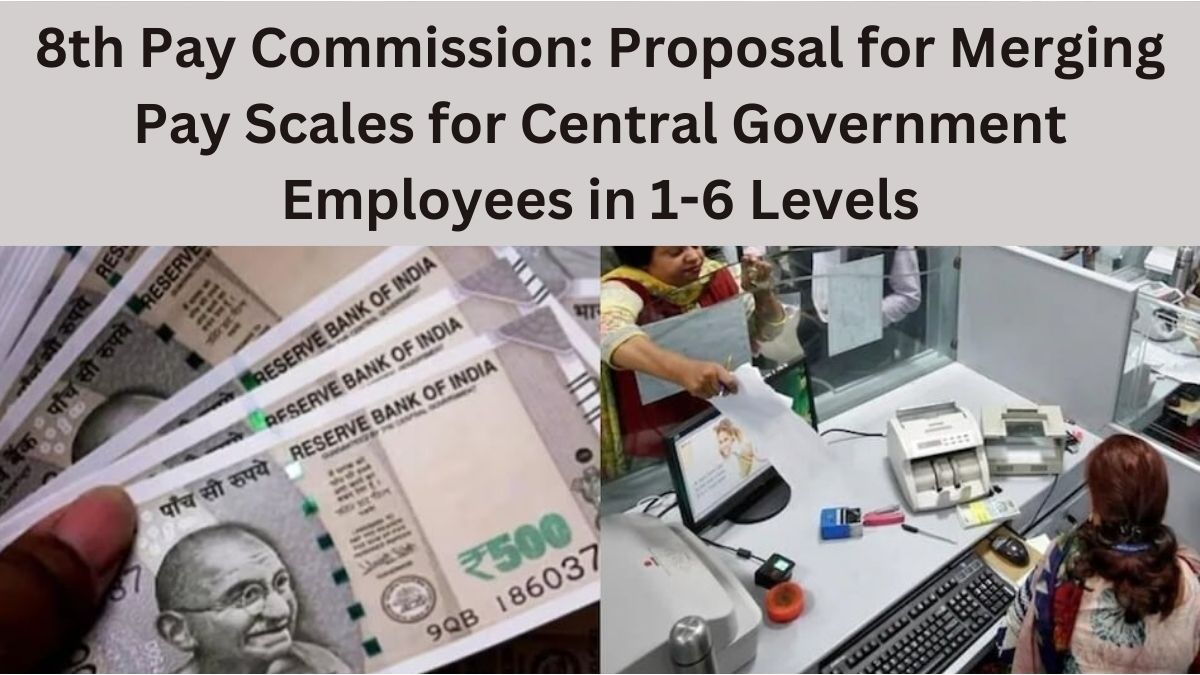The 8th Central Pay Commission (CPC) is set to introduce significant changes to the salary structure of central government employees. One of the key recommendations involves merging pay scales from levels 1-6 to enhance career progression and simplify salary structures. This proposal aims to address disparities in pay progression and ensure a fair and transparent compensation system for government employees and pensioners.
Understanding the 8th Pay Commission
On January 16, 2025, the Union Cabinet, under the leadership of Prime Minister Narendra Modi, approved the establishment of the 8th Pay Commission. The commission is responsible for reviewing and recommending salary and allowance revisions for nearly 50 lakh central government employees and 65 lakh pensioners.
This review process will focus on:
- Salary restructuring for improved pay progression
- Allowance revisions to align with inflation and cost of living
- Pension updates to enhance financial security for retirees
The commission’s recommendations will play a critical role in shaping the financial well-being of millions of government employees and retirees.
National Council’s Recommendations for the 8th Pay Commission
The National Council of the Joint Consultative Machinery (NC-JCM) Staff Side has submitted its recommendations regarding the Terms of Reference (ToR) for the 8th CPC. These recommendations highlight critical areas requiring reform, particularly focusing on salary structures, allowances, and employee benefits.
Key Recommendation: Merging Pay Scales for Levels 1-6
One of the most impactful proposals from the NC-JCM is the merging of lower pay scales (levels 1-6) to streamline career progression and eliminate salary stagnation.
Currently, the 7th Pay Commission defines 18 levels in the government pay matrix. Under this structure:
- Level 1 employees earn a minimum of ₹18,000 per month
- Level 18 employees earn a maximum of ₹2,50,000 per month
The new proposal suggests merging adjacent pay levels to create a more structured and fair salary system for government employees.
Proposed Pay Scale Merger and Salary Revisions
The Staff Side of NC-JCM has suggested the following salary consolidations:
| Current Pay Levels | Proposed Merger | Existing Salary (₹) | Revised Salary (₹) (with 2.86 Fitment Factor) |
|---|---|---|---|
| Level 1 & Level 2 | Merged into one | ₹18,000 – ₹19,900 | ₹51,480 |
| Level 3 & Level 4 | Merged into one | ₹21,700 – ₹25,500 | ₹72,930 |
| Level 5 & Level 6 | Merged into one | ₹29,200 – ₹35,400 | ₹1,01,244 |
Expected Benefits of Pay Scale Merger
- Fairer Salary Progression: By merging levels, employees can experience smoother salary growth without long waiting periods.
- Elimination of Stagnation: The consolidation will ensure that employees do not remain in the same pay grade for an extended duration.
- Enhanced Career Prospects: Employees in lower grades will have better opportunities for career advancements.
- Increased Take-Home Salary: The fitment factor of 2.86 could result in a substantial salary boost, benefiting lower and middle-level employees.
- Greater Financial Stability: Pensioners will also benefit as their retirement payouts will align with revised salary structures.
Other Key Proposals by the Staff Side
Apart from merging pay levels, the NC-JCM Staff Side has put forth additional recommendations aimed at improving financial security and employment conditions:
1. Integration of Dearness Allowance (DA) and Dearness Relief (DR)
- The Staff Side has strongly advocated for the inclusion of DA and DR into the basic pay and pension structure.
- This will help government employees and pensioners counter the rising inflation and ensure financial stability.
2. Timely Revision of Allowances
- Regular adjustments to allowances such as House Rent Allowance (HRA), Travel Allowance (TA), and Medical Allowance are being proposed to align with current economic conditions.
3. Enhanced Pension Benefits
- The revision of pensions under the 8th Pay Commission will ensure that retired employees receive adequate financial support in line with inflationary trends.
Next Steps: Implementation of the 8th Pay Commission
To finalize these recommendations, the Staff Side has requested a Standing Committee Meeting with government officials. The next steps in the process include:
- Formation of the Pay Panel – The government is expected to appoint a three-member 8th Pay Commission panel later this month.
- Review and Recommendations – The commission will conduct a detailed study over the next 12 months before submitting its findings.
- Final Government Approval – Based on the commission’s recommendations, the central government will approve the new salary and pension structures for over 1.2 crore employees and pensioners.
Frequently Asked Questions
1. What is the 8th Pay Commission?
The 8th Pay Commission is a government-appointed body which is responsible for reviewing and revising the salary structures and allowances of central government employees and pensioners.
2. How will the proposed pay scale merger benefit employees?
The merger will simplify salary structures, enhance career progression, reduce stagnation, and improve financial stability for lower and middle-level employees.
3. When will the 8th Pay Commission’s recommendations be implemented?
The commission is expected to submit its recommendations within 12 months, after which the government will finalize the salary and pension revisions.
4. What is the fitment factor, and how does it impact salaries?
The fitment factor is a multiplication factor applied to existing salaries to determine revised pay under the new pay commission. The proposed fitment factor of 2.86 could significantly increase employee salaries.
5. Will pensioners also benefit from the new pay commission?
Yes, pensioners will benefit as pensions will be revised in alignment with the new salary structure, ensuring better financial support.
6. What are the key allowances being reviewed under the 8th Pay Commission?
Key allowances include Dearness Allowance (DA), House Rent Allowance (HRA), Travel Allowance (TA), and Medical Allowance, among others.
7. Who is responsible for finalizing the recommendations of the 8th CPC?
The Union Cabinet and the Department of Personnel and Training (DoPT) will review and approve the final recommendations of the 8th Pay Commission.
Click here to know more.
Kishan is a knowledgeable writer specializing in agriculture and the latest government job recruitments, delivering clear and insightful content to inform and empower readers.
